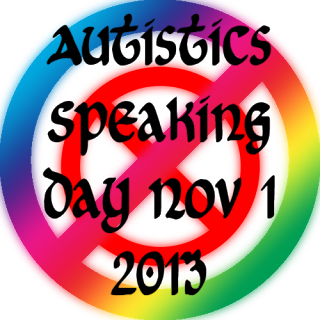Autistics Speaking Day 2011Doubt
There are four learned men on a train travelling through Scotland. As they are looking out the window, they see a sheep.
"Ah," says the first man. "Sheep are white in Scotland."
"Some sheep are white in Scotland," corrects the second.
"At least one sheep in Scotland is white," adds the third.
"There exists in Scotland a sheep which is white on this side," says the fourth man, and returns to his book.
Autists tend, as a rule, to be like that fourth man. So when we are trying to distil what the "Austistic Experience" is like, we tend to qualify strongly: I don't know what the "Autistic Experience" is, because I don't know all Autists. Not even 'most' Autists by orders of magnitude. I know a couple of others, I suppose, but I wouldn't call that "many". And anyway, I don't know what their internal experience is. I am able to speak for exactly one Autist -- myself ... some of the time.
And Autists tend to take people at face value. It takes us effort to consider that someone might be lying, or that they might have an agenda which is distorting their evidence, or that they might, despite their air of assured confidence in their own correctness, simply be utterly wrong.
We doubt. But because of a lifetime of being the odd one out, of being the one quiet dissenter in what appears to be a sea of unanimity, we most of all doubt ourselves. There's always that niggling voice in the back of your head whispering "... or maybe it's just you."
Or maybe that's just me.
Combine that with Alexithymia: the inability to articulate -- even to yourself -- your own internal emotional state, and we find ourselves blown about in the breeze. Maybe that article which says that Autists are like psychopaths is true. Maybe all Autists are characterised by uncontrollable rages and incessant stimming. Maybe Autists really don't care about other people.
And yet... I have learned to control my rages, most of the time. I only stim when I'm stressed... so as I notice, anyway. I certainly
think I care about others.
Maybe I don't cope as well as I think I do. Maybe I just
think I care about others, but I don't really. I have logical reasons for why I want to be around my wife and my children, but I also have times where I want even them to just go away and leave me alone for a while. I don't know what "Love" is supposed to feel like; how do I know that I'm not just pretending to "love" them... even to myself?
Or else... maybe this is evidence that I'm not *really* Autistic. Maybe I'm just lazy and undisciplined and stupid, like I spent most of my life thinking I was. Maybe those people on the internet are right, and I am just inventing a condition to explain away my failings. Maybe I'm running away from my own broken self, instead of facing it and fixing it. Maybe if my experience of "love" is so different from how it's described, then I don't really-- No. I can't even finish that thought, not even hypothetically.
Is that evidence for or against the proposition?
Which proposition?
It's really, really hard to put your own experience to the front, and have the strength of will to assert, even to yourself; "Maybe everyone else is wrong." Especially so when your entire life has been the experience of being the one who is the odd one out, whichever group you are in.
Assumption
“Before a man speaks it is always safe to assume that he is a fool. After he speaks, it is seldom necessary to assume it.”
--- H. L. Mencken
We fight, our whole lives, against assumptions. We all do: men, women, Autistic, Neurotypical, gay, straight, black, white,
everyone. We are formed by what we are thought to be, by others, and by ourselves. We are expected to be smart or dumb, base or refined, educated or ignorant, cold or emotional. Other people treat us differently based on these assumptions, and we expect more or less of ourselves based on how we match up to our own expectations of ourselves -- our assumptions of what we
should be.
We, all of us, are moulded by society, by those who surround us. For high functioning Autists, this is no less true.
Before diagnosis, this force to conform can cause intolerable stress. There are things which we are expected to do which Autists simply cannot do, or can only do with difficulty. Things which are taken for granted so much as to be invisible until the convention is broken.
People are supposed to like socialising. People are supposed to be able to look one another in the eye, unless they have something to hide. People are supposed to be able to chat in noisy places. People are supposed to react appropriately in a social context. People aren't supposed to freak out in crowds. People aren't supposed to find common and unremarkable sensations to be intolerable. There are all sorts of things you don't realise you assume until that assumption is violated.
And there are assumptions made about those broken assumptions. If you can't hold someone's gaze, you are assumed to be shifty. If you overcompensate and stare, you're assumed to be creepy. If you can't remember what you were supposed to be doing, you're scatterbrained, or undisciplined, or lazy. If you react too oddly, then you're rude.
Awareness
“We live on a placid island of ignorance in the midst of black seas of infinity, and it was not meant that we should voyage far.”
--- H.P. Lovecraft
After diagnosis, the stresses are different. First, there is the stress of re-evaluating one's entire life in the light of this new information. It's not a trivial thing to retrofit such a fundamental and powerful addition to one's very self-identity.
But then you start to pay more attention to what people say about Autists and Aspies. You can't help it: you hear the word "autist" and your ears prick up, you join an internet group to see what people are saying. You discover yourself as a citizen of a new world. And with that, you discover that not all the things said about you are nice.
You discover that people are antagonistic to Aspies, because they knew someone who everyone knew was an Aspie, and he was a rude entitled prick. (Well, I'm sorry about that, but I don't think that person is representative... or is he? How would I know?) They are antagonistic to the very idea of Asperger's Syndrome, because it's an excuse to be a rude entitled prick, and it's not even a real condition, it's just bad behaviour, and those spoiled brats wouldn't even be that bad if their mothers and doctors stopped coddling their
tantrums and gave them
more beatin-- discipline. People who get upset with you when you point out that the link between Autism and Vaccines has been proven to be not just wrong but
actively fraudulent, as if it's your fault that they have left their children vulnerable to Rubella. You discover that Autists
aren't really people, they're more like
soulless shells in human form. You discover that you aren't your parents' child, but an empty changeling left behind after the Autism fairy visited and cursed your family. You discover that
Autists don't feel emotions: we're
like psychopaths, but we're the
'good' kind.
And, every time, there's the Doubt. But -- I'm not that annoying ... am I? I'm not throwing tantrums because I'm an immature entitled man-child ... am I? I feel emotions so strongly that they can tear apart my soul from the inside ... or do I?
Or is it that those emotions are the proof that I'm not
really Autistic, that when I present myself as such, that I'm lying. I don't
really belong in this community. I don't
really deserve to ask for help from that association. I don't
really merit accommodations, it's not really an explanation.
Maybe I'm just the horrible failure of a human being I always thought I was.
Maybe it's just me.
Hope
“Learn from yesterday, live for today, hope for tomorrow. The important thing is not to stop questioning.”
--- Albert Einstein
But then... in these communities, even as I struggle against my own instinct to flee them in shame, as a stranger and an alien and an imposter, I find something vanishing rare and precious: people who are saying the thoughts in my mind.
Even in such benighted places as television, there are characters who I actually understand, and who have their own dignity in their difference.
Mr Spock, Worf, Sheldon Cooper, Temperance Brennan. They all find themselves surrounded by aliens who are doing bizarre things for incomprehensible reasons. Where the incomprehension goes both ways, where the people around them don't understand
why their passions are so important to them,
why they react as they do -- as they must. And these characters must at least pretend to conform. And it is shown -- in
Star Trek, and
Big Bang Theory, and
Bones -- that they are willing to make the effort, but it
is an effort, and it's hard, and exhausting, and sometimes you just need to meditate, or fight holographic enemies, or lose yourself in physics, or run away to Paraguay.
We learn, all of us, every day. Not everything comes naturally, though. Muscles grow tired, and not all start as strong as others. Most of us can pass as normal for a while. But it's bearing a heavy load, and all of us need to put it down and be ourselves at times.
Some of us are lucky enough to have found a place, and found people, where we can do that and still be accepted. Where we can put down the mask for a while and stop doing the over-the-top monkey gesticulations which people seem to expect as feedback: grimaces and rubbery faces, where a simple raised eyebrow and long-held look feels more natural. Where it is understood that we get overwhelmed, and not pushed past our limits. That we do get upset at stuff which seems trivial to other people. We know it's trivial, we don't want to get upset -- not least because we know it upsets those around us -- but we do. Giving us warning of change takes some of the sting, else allowing us to hide away and get good and angry until it's out of our system, or else hide away and cry for no reason we can articulate. Where people remember that we hate the telephone with an abiding passion, and don't make us make calls unless we have to. Where we don't have to talk (I'm highly verbal, but sometimes it takes more effort than it seems worth to force the words out, when I don't have the energy to be other than silent).
I've been blessed in finding such a place, and such people.
I hope that in this, at least, it's not just me.
(
My effort from last year.)

 Overload is a feature of autism, to the point were I would talk about how my autism interacts with my circumstance, but there is so much going on that I find myself unable to extract any particular thing to discuss: the forest is so big, I can't describe any trees.
Overload is a feature of autism, to the point were I would talk about how my autism interacts with my circumstance, but there is so much going on that I find myself unable to extract any particular thing to discuss: the forest is so big, I can't describe any trees. I don't really think of myself as "disabled".
I don't really think of myself as "disabled".